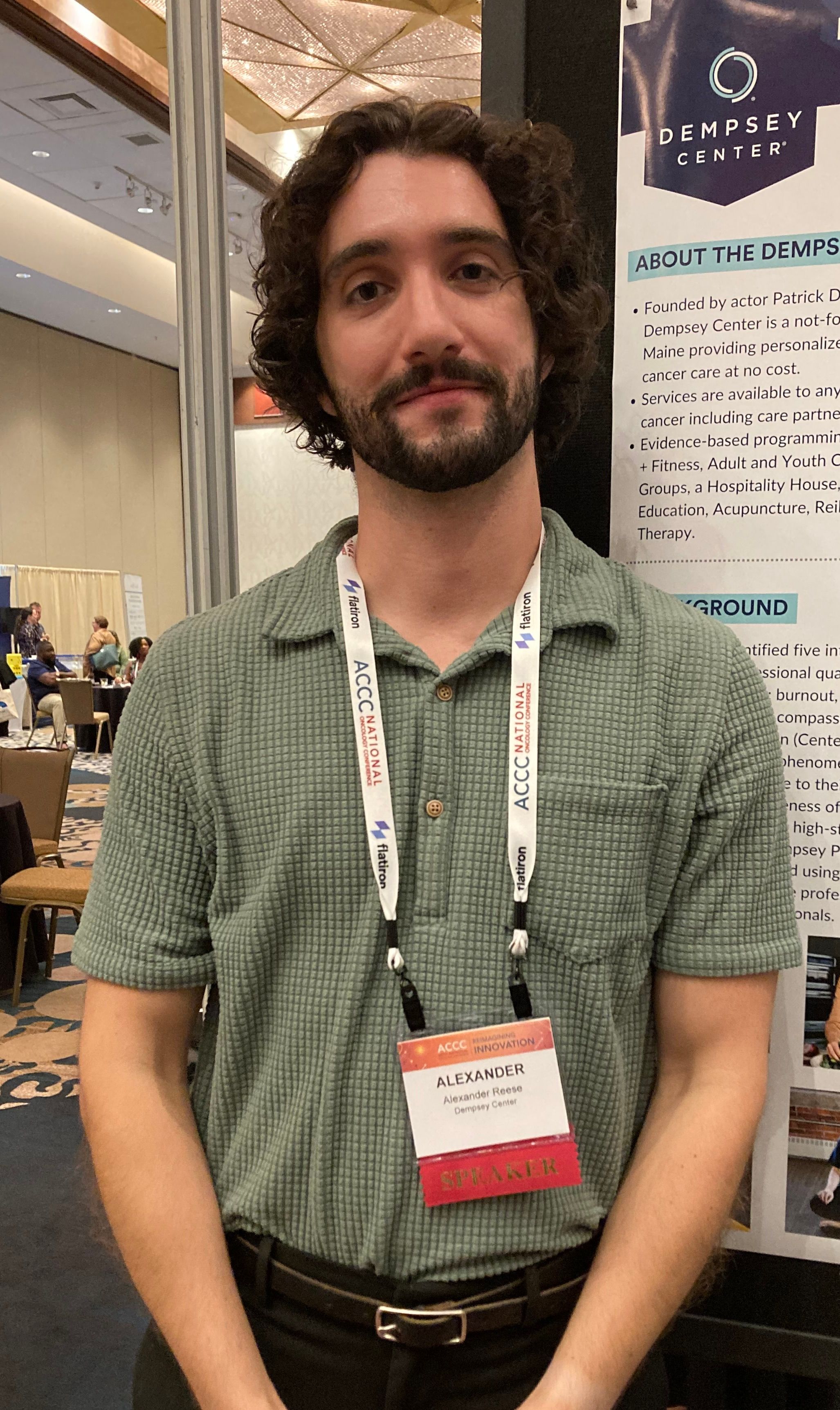- Center on Health Equity & Access
- Clinical
- Health Care Cost
- Health Care Delivery
- Insurance
- Policy
- Technology
- Value-Based Care
Dempsey Center Research Demonstrates Importance of Supporting Oncology Care Providers
The interrelated concepts of burnout, secondary traumatic stress, moral distress, compassion fatigue, and compassion satisfaction have been identified as having a profound impact on the quality of life of health care providers.
Alex Reese, MA, MSIS, The Dempsey Center

The Dempsey Center, with locations in Lewiston, South Portland, and Portland, Maine, was among the few cancer centers selected to present its research through a poster1 at this year’s Association of Community Cancer Centers 40th National Oncology Conference, held October 4-6, in Austin, Texas. This year marks the first time the conference has presented posters.
First opened in 2008 by actor Patrick Dempsey as a tribute to his mother Amanda following her ovarian cancer journey, the nonprofit center has become a well-known source of relief, comfort, resources, and support for those affected by cancer,2 including care partners, with services that include adult and youth counseling, a hospitality house (Clayton’s House), nutrition guidance and education, and support groups.
This research presented in the poster, from the Dempsey Provider Wellbeing Program, highlights the impact that 5 interrelated concepts can have on the professional quality of life (QOL) of its health care providers: burnout, secondary traumatic stress, moral distress, compassion fatigue, and compassion satisfaction. Evidence-based guidelines helped to shape the formation of this program, which focuses on enhancing the professional QOL of its health care professionals. Using qualitative and quantitative outcomes, the authors assessed the need for additional interventions for their health care staff.
The Professional Quality of Life (ProQOL)-Health measure is meant to help understand the positive and negative experiences of those affected by trauma and suffering to get them optimized assistance and for administrators to keep their own balance,3 was the first step in this research. The survey provided study authors with insight into baseline fatigue levels and factors that contributed to fatigue so they could best determine recommended interventions; the score range was 0 to 30, with high scores on perceived support and compassion satisfaction and low scores on burnout, secondary traumatic stress, and moral distress indicating positive results.
A 1-hour goal-setting course followed, which included orientation to the participants’ aggregate ProQOL-Health scores and shared language for discussing professional QOL. Four 30-minute courses were also delivered that focused on shared language, new coping skills, and daily practices aimed at helping to reduce compassion fatigue and enhance compassion satisfaction and perceived support. These were developed by the center’s Lisa Balsam, BSN, RN, COC, CRC, and Kailie Sullivan, LCSW, OSW-C.
The ProQOL-Health was administered once more following the course series to track how results compared with the baseline findings.
“It was very well received. Talking about these things was probably one of the most helpful things for the staff,” noted Alex Reese, MA, MSIS, who presented the poster at the conference. “They were able to see which activities were their favorites, which ones kind of made the biggest connection with the physiological side or thinking about their emotions.”
Results show that perceived support remained high, starting and finishing at a score of 26. The findings on compass satisfaction were similar, with an overall score of 24 from start to finish.
“Compassion satisfaction scores increased in direct service providers, defined as any staff members who spends the majority of their time working directly with patients, and remained stable for non–direct service providers,” the authors wrote.
Burnout scores improved, dropping 7% from an initial 15 to 14 by the time the ProQOL-Health was administered for the second time. However, the biggest gains were seen for secondary traumatic stress and moral distress, as evidenced by drops of 18% (from a score of 17 to 14) and 27% (from a score of 11 to 8), respectively from the first to the second evaluation. These findings were seen irrespective of the health care provider having a direct or non–direct service role at the center.
“I’ve had moments before when the work has felt particularly heavy and I have wondered if I’m ‘cut out for it,’ yet this series normalized those feelings and gives permission to take care of myself without judgment and without questioning my ability to do the work I love,” explained a Dempsey center staff member. “Creating and executing this series communicated that not only does leadership hear us, they also see the value in making self-care a part of our organizational culture.”
Overall, these findings echo how burnout, secondary traumatic stress, moral distress, compassion fatigue, and compassion satisfaction are interconnected and can affect the well-being and professional effective of oncology care providers. The study authors underscore that recognizing and addressing these 5 factors is crucial if work environments are to remain supportive and resilient, if the quality of care is to improve, and if these challenges are to be prevented in the field of oncology care.
“We are kind of unique, because we are a nonprofit that complements oncology care; we’re not technically health care,” Reese noted, “Our hope is that this research can work with and be applied in different health care settings. We’d like to see it applied in different settings.”
References
1. Balsam L, Sullivan K, Reese A. Improving compassion fatigue and quality of life for oncology care providers. Poster presented at: Association of Community Cancer Centers 40th National Oncology Conference; October 4-6, 2023; Austin, TX.
2. The origin of the Dempsey Center. Dempsey Center. Accessed October 6, 2023. https://www.dempseycenter.org/about/team/patrick-dempsey/
3. ProQOL Health Measure. The Center for Victims of Torture. Updated 2021. Accessed October 6, 2023. https://proqol.org/proqol-health-measure
